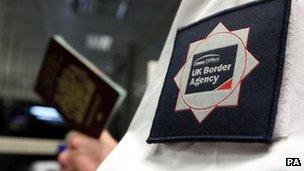Company migrants to UK outnumber skilled worker visas
- Published

The government has pledged to cut net migration to the "tens of thousands"
Three times more migrant workers came to the UK on companies' transfers schemes than on general visas for skilled workers, official figures show.
Firms using the intra-company transfer (ICT) scheme brought in 29,700 non-European staff in the 12 months to September 2011.
But those entering via visa schemes could be as low as 10,000, despite a cap of 21,700, the Home Office's Migration Advisory Committee said.
Ministers want to cut net migration.
Prime Minister David Cameron says he wants the overall figure to reach "tens of thousands" by 2015. It is currently around 250,000.
'Substantially higher'
The ICT scheme, used by firms to bring their own people into the UK for more than a year to do specific jobs, should be kept under review, the committee said.
The number of entrants to the UK via ICT per million of the population was "substantially higher for the UK" than for comparable countries such as the US, Spain, Canada, Australia, Japan, Germany and Ireland.
Committee chairman David Metcalf said it needed to be kept "under review".
He suggested that if the government wanted to limit the use of ICTs, it could raise the £40,000 income threshold, increase the skill level required or limit the number of work permits any one sponsor could have.
But he said: "Some of these transfers are vital, such as the Japanese auto engineer testing cylinder heads made in Japan and training British workers to do such testing.
"Other types of intra-company transfers have evolved over time, particularly those used for third-party contracting in the information technology sector, where it is possible that the UK economy is benefiting in aggregate terms while at the same time some displacement of British workers is occurring."
He added: "They are doing absolutely nothing wrong here, but it's consultancy companies bringing workers in, typically IT workers, typically from India."
They carry out some work in India and then come to the UK to do other work at the UK client's base, before returning to India to complete the work, he said.
Professor Metcalf also said: "It's here that I think we need to keep this under review. It's this group which has grown substantially in the past decade, even in the last five years.
"It is the case these workers may well be displacing British IT workers, but equally it may well be that UK plc gains overall."
One firm alone, which is a major manufacturer in Britain but also has a consultancy arm, brought in 4,000 migrant workers alone last year, Prof Metcalf said.
He added that if the government was concerned about bringing net migration down from about 250,000 now to "tens of thousands" by 2015, as Prime Minister David Cameron has said, it "should not hit the Hondas and Toyotas of this world, because that would look very badly on UK plc".
The number of ICTs had surged from around 20,000 in 2009 to about 30,000 in mid-2011, but had remained largely flat since then.
Shadow immigration minister Chris Bryant said the report "shows the ever widening gap between this Government's rhetoric on immigration and the reality of their policies".
"This government needs to tone down its rhetoric and get in touch with reality.
"We need strong controls on people who want to come here. They should pay their way and add value to our country. I hope we can all agree on that, but the Government needs to be honest with people and get tougher on illegal immigration too."
- Published25 January 2012
- Published10 January 2012
- Published1 January 2012